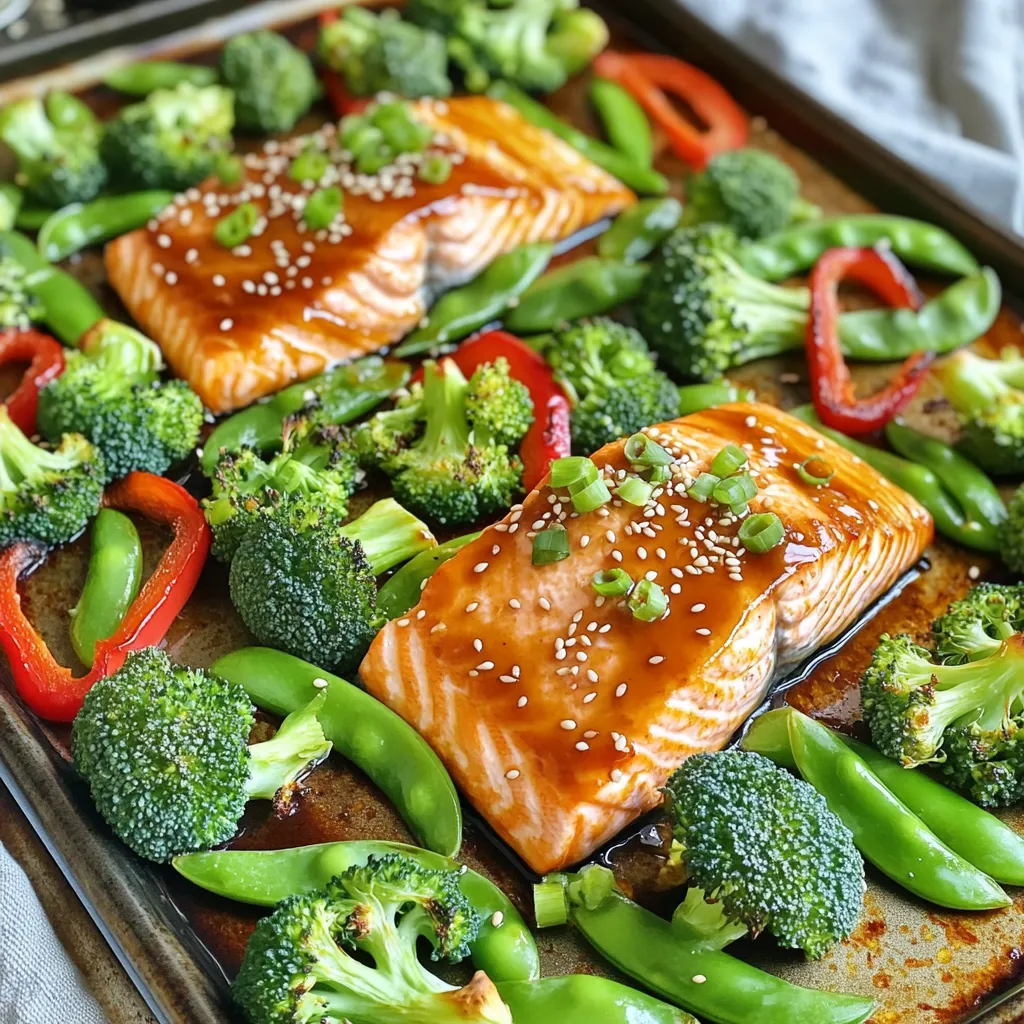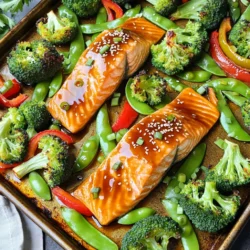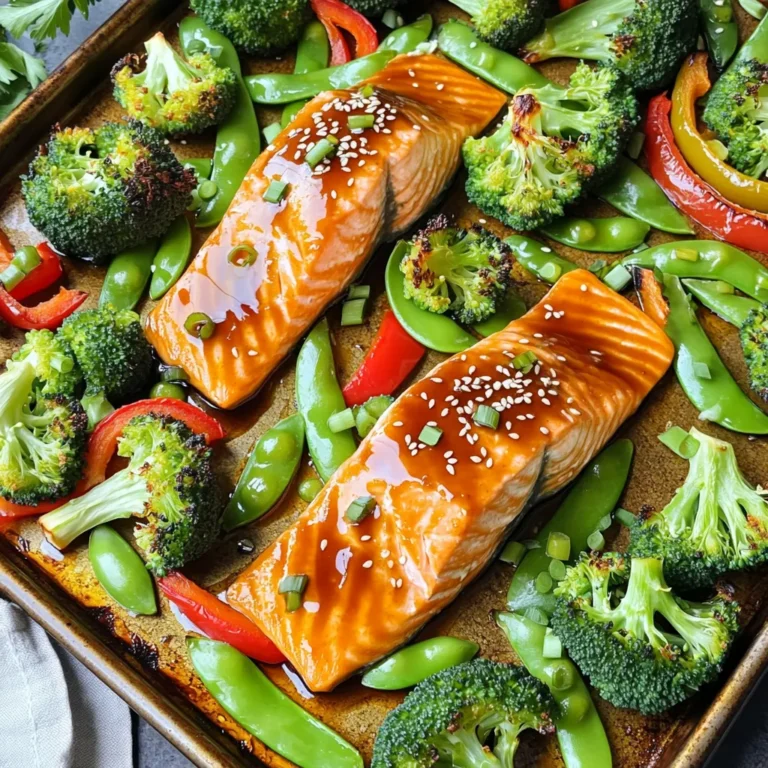Get ready to bring bold flavors to your dinner table with my Savory Sheet Pan Teriyaki Salmon & Veggies Recipe! This easy dish combines tender salmon fillets with crisp veggies, all roasted to perfection on one pan. You’ll love how simple it is to prepare, and the cleanup? A breeze! Let’s dive into the ingredients and get cooking—you’re just a few steps away from a delicious, healthy meal!
Ingredients
List of Ingredients
For this tasty dish, you will need:
– 4 salmon fillets
– 2 cups broccoli florets
– 1 red bell pepper, sliced
– 1 cup snap peas
– 3 tablespoons teriyaki sauce
– 2 tablespoons olive oil
– 2 cloves garlic, minced
– 1 teaspoon fresh ginger, grated
– Salt and pepper, to taste
– 1 tablespoon sesame seeds, for garnish
– 2 green onions, chopped, for garnish
Fresh vs. Frozen Options
Using fresh ingredients always gives the best flavor. Fresh salmon has a nice texture. Fresh veggies, like broccoli and snap peas, keep their crunch. However, frozen options can work in a pinch. They are convenient and often just as healthy. If using frozen salmon, thaw it first. Frozen vegetables can be added directly to the pan without thawing.
Ingredient Substitutions
You can swap ingredients if needed. Use another fish, like trout or cod, instead of salmon. For a plant-based option, try tofu or tempeh. If you don’t have teriyaki sauce, mix soy sauce with honey or maple syrup. You can also change the veggies based on what you have. Carrots, zucchini, or bell peppers work well, too.
Step-by-Step Instructions
Prepping the Oven and Ingredients
First, set your oven to 400°F (200°C). This high heat helps cook everything evenly. Next, gather your ingredients: salmon fillets, broccoli, red bell pepper, and snap peas. Wash the veggies under cool water. Cut the red bell pepper into thin slices. Make sure to separate the broccoli into small florets. Having everything ready makes cooking easier.
Mixing the Teriyaki Sauce
In a small bowl, mix together the teriyaki sauce, olive oil, minced garlic, and grated ginger. Use a whisk to blend them well. This sauce will add great flavor to both the salmon and veggies. If you want more sweetness, add a bit more teriyaki sauce. If you like it spicy, a dash of chili flakes can work too.
Arranging the Salmon and Veggies on the Sheet Pan
Take a large sheet pan and spread out the broccoli, red bell pepper, and snap peas. Drizzle half of the teriyaki mixture over the veggies. Toss them gently to coat them well. Next, put the salmon fillets right in the center of the pan. Season each fillet with salt and pepper. Brush the remaining teriyaki sauce over the salmon. This helps keep it moist and flavorful.
Baking Instructions
Now, place the sheet pan in your preheated oven. Bake for 15 to 20 minutes. Check the salmon after 15 minutes. It should flake easily with a fork. The veggies should also be tender but still crisp. When it’s done, carefully take the pan out. Sprinkle sesame seeds and chopped green onions on top for a nice finish. Enjoy your meal straight from the pan for a fun touch!
Tips & Tricks
Perfect Cooking Times for Salmon
For the best results, bake your salmon for 15 to 20 minutes. Check for doneness by using a fork. The salmon should flake easily. If it is still raw in the center, give it a few more minutes. Each oven is different, so keep an eye on it as it cooks.
Ensuring Vegetables Stay Crisp
To keep your veggies crisp, do not overcrowd the pan. Spread them out evenly. Toss them in half of the teriyaki sauce before baking. This method lets the heat circulate and keeps them from steaming. Also, bake them for about 10 minutes before adding the salmon. This way, they cook perfectly without getting soggy.
How to Adjust Flavor Profiles
To change the flavor, play with the teriyaki sauce. Add more ginger for spice or honey for sweetness. You can also try adding lime juice for a zesty kick. If you like heat, sprinkle some red pepper flakes. Taste as you go to find your perfect balance.

Variations
Alternative Proteins
You can swap salmon for other proteins. Chicken breasts work well in this dish. They cook nicely and soak up the teriyaki flavor. If you prefer a plant-based option, try firm tofu. Cut the tofu into cubes and marinate it in the same teriyaki sauce. It gives a tasty twist while keeping it healthy.
Veggie Variations
Feel free to mix up the veggies! Asparagus, zucchini, or carrots can add color and crunch. You can also use baby corn or bell peppers of different colors. Just ensure they are cut to similar sizes for even cooking. This way, every bite is delicious and fun.
Gluten-Free Teriyaki Sauce Options
If you need a gluten-free option, use tamari instead of regular soy sauce. Tamari is made without wheat but has a similar taste. You can also find gluten-free teriyaki sauces at many stores. Just check the label to make sure it meets your needs. This way, everyone can enjoy this dish!
Storage Info
Storing Leftovers
After cooking, let the dish cool down for about 30 minutes. Then, place the leftovers in an airtight container. This will keep your salmon and veggies fresh. Store them in the fridge for up to three days. If you notice any strong smells, it’s best to toss them out.
Reheating Instructions
To reheat your leftovers, use an oven or a microwave. If using an oven, set it to 350°F (175°C). Place the salmon and veggies on a baking tray. Heat for about 10-15 minutes. If using a microwave, place them in a microwave-safe dish. Heat in 30-second intervals until warm. This helps keep the salmon moist.
Freezing Guidelines
You can freeze the salmon and veggies if you want to save them for later. Use freezer-safe containers or bags. Make sure to remove as much air as possible. Label with the date. They will stay good for up to three months. When ready to eat, thaw them overnight in the fridge. Then reheat as needed.
FAQs
Can I use a different sauce instead of teriyaki?
Yes, you can! You could use soy sauce, hoisin, or even a sweet chili sauce. Each sauce adds its own flavor. If you want a spicy kick, try sriracha. Just keep in mind that the taste will change based on what sauce you pick.
How do I know when the salmon is cooked through?
You can check if the salmon is done by using a fork. Gently poke the thickest part of the fillet. If it flakes easily, it’s ready. You can also use a meat thermometer. The salmon should reach 145°F (63°C) to be safe to eat. It’s best not to overcook it, as it can get dry.
What vegetables work best for this recipe?
Broccoli, red bell peppers, and snap peas are great choices. They cook well and stay crisp. You can also add carrots, zucchini, or asparagus for more color and flavor. Just remember to cut them into similar sizes for even cooking.
This blog post covered key ingredients for salmon and veggies, including fresh and frozen choices. I shared step-by-step baking instructions and useful tips to ensure your meal turns out great. You also learned about variations, storage, and common questions.
Try different veggies or sauces for fun twists. Experimenting with flavors will keep meals fresh and exciting! Enjoy cooking and sharing this delicious dish.


